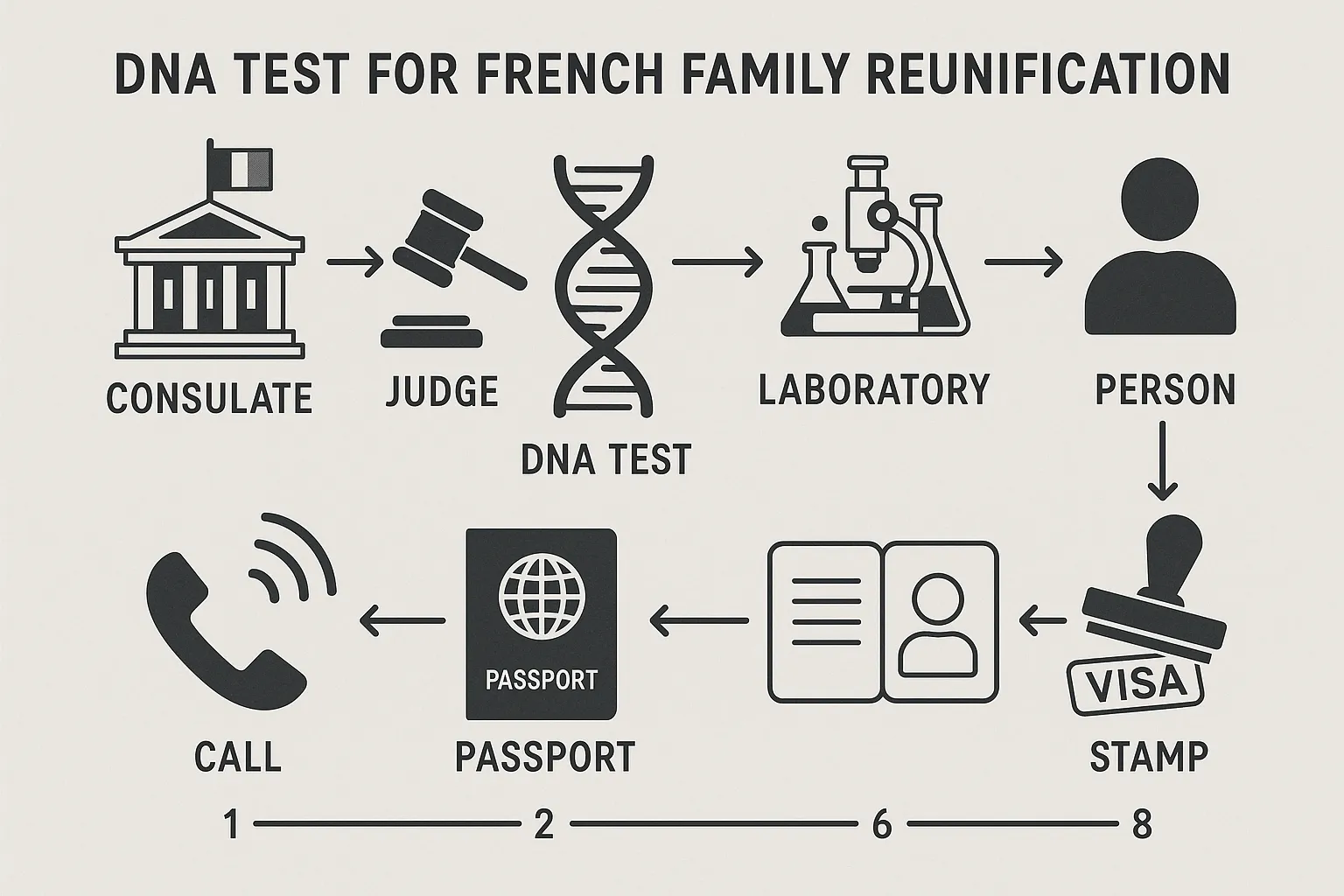DNA Testing in Family Reunification Cases: Procedures and Pitfalls

Why DNA tests sometimes become necessary in French family reunification files
Most applications for family reunification or a long-stay visa marked “famille de Français / regroupement familial” succeed on the strength of civil status documents alone. However, when:
- a birth certificate is missing or considered unreliable by the French authorities,
- there are contradictory spellings or dates on foreign records,
- the child was born in a country with no reliable civil registry,
consular officers may invite the applicant to prove the biological link through a voluntary DNA test. In 2025, the number of tests remains small (fewer than 2 000 a year according to the French Ministry of the Interior), but mishandling the procedure can delay or sink a reunification file.
This guide explains, in plain English, the legal framework, step-by-step process and the main pitfalls to avoid. It is aimed at parents who wish to bring their minor children to France, but the information also applies to adult children supporting an ascendant or other exceptional family scenarios.
1. The legal foundation: DNA testing is exceptional and strictly regulated
DNA testing for immigration purposes is governed by:
- Article 16-11 of the French Civil Code,
- Article L111-6 of the Code of Entry and Residence of Foreigners and the Right of Asylum (CESEDA),
- Decree n° 2007-1799 of December 19, 2007.
Key takeaways:
- The test is voluntary. No one can be forced to undergo it. Refusal is possible but will often be interpreted as a lack of proof and may result in a negative decision.
- It is authorized only when no other conclusive evidence can establish the parent-child relationship.
- The request must come from the applicant (not from the consulate), be transmitted by the French consulate to the Procureur de la République in Nantes, and then approved by a French family court judge.
- Sampling and analysis must be carried out in France by a laboratory accredited by the French Accreditation Committee (Cofrac) and listed by the Ministry of Justice.
- Results are confidential and sent directly to the judge, who forwards an official summary to the consulate.
Trying to cut corners by ordering a commercial kit online (23andMe, MyHeritage, etc.) is pointless: French authorities will simply discard the result.
2. Who is eligible for a DNA test?
Only specific family ties are covered:
- Biological mother – child
- Biological father – child
Spousal relationships, siblings, grandparents or guardianship situations are excluded. If adoption is involved, you must instead produce the final adoption judgment or pursue an adoption plénière recognized by France.
3. Step-by-step procedure (2025 version)
- Initial file submission – You lodge the family reunification or long-stay visa application with civil documents. The consulate indicates that parentage is not sufficiently established and hands you a DNA request form.
- Formal request – You sign the form, confirming the voluntary nature, and return it to the consulate with ID copies and the child’s consent if over 13.
- Judicial authorization – The consulate forwards the file to the prosecutor in Nantes. Expect 4–6 weeks for the family court judge to issue an authorization order (ordonnance d’expertise génétique).
- Choosing an accredited laboratory – The authorization lists several Cofrac-accredited labs in mainland France. You select one and contact them to arrange payment (typically €200–€350 per individual tested) and logistics.
- Sample collection
- In France: the resident parent and any children already in France visit the lab or a court-appointed doctor for buccal swabs.
- Abroad: the consulate organizes a sampling session with a sworn doctor who seals the samples under diplomatic pouch.
- Analysis and report – The lab performs STR analysis and issues a probability ratio. French jurisprudence accepts parentage at >99.8% probability.
- Transmission of results – The lab sends the sealed report to the judge, who transmits a one-page conclusion to the consulate (positive/negative). Neither the raw data nor the detailed report is shared with immigration authorities.
- Consular decision – If positive, the visa or réunification approval proceeds; if negative, the application is usually refused, but you retain the right to appeal.
Timeline: From the initial request to the final result, budget 3–5 months.

4. Common pitfalls and how to avoid them
- Submitting unauthenticated documents – Even with a DNA test, the civil status records must be legalized or bear an apostille. Missing stamps trigger additional delays.
- Wrong laboratory choice – Only use the labs on the Ministry of Justice list. A quick Google search is not enough; always verify the Cofrac number.
- Mismatched identity information – The lab form must reproduce the exact spelling on the passport or birth record. A single typo can invalidate the test.
- Chain-of-custody breaks – Opening the sampling kit, resealing, or shipping it yourself breaches protocol. Always let consular staff manage transport.
- Children born through medically assisted reproduction – If a donor was involved, the genetic link may not match the legal parentage. Seek legal advice before requesting testing.
- Late request for renewal – Some applicants wait until a refusal to ask for DNA. Making the request at the earliest consular hint saves months.
5. How much does it cost, and who pays?
- Average lab fee (2025): €220 per person tested.
- Consular sampling fee: €0 (included in administrative services).
- Courier costs for sealed diplomatic pouch: usually covered by the State.
Applicants must advance the lab fees. Should the result come back negative, the fees are not refunded.
6. What happens if the result is negative?
A probability below 99.8% is deemed insufficient. The consulate will issue a refusal letter citing lack of proof of parentage. Your options are:
- File an administrative appeal (recours gracieux) within two months.
- Bring the case before the Administrative Court of Nantes. You may argue procedural errors or present new evidence, but without another legal basis, overturning a DNA-based refusal is difficult.
Seeking professional legal help is strongly recommended at this stage.
7. Alternatives to DNA testing
Before accepting a genetic test, explore less intrusive proofs:
- Late registration of birth certificates at the local civil registry followed by legalization.
- Baptismal or hospital records.
- School enrollment certificates mentioning the parents.
- Affidavits from local authorities, provided they can be legalized.
These documents, when combined, can sometimes convince the consular officer without resorting to genetics.
8. How ImmiFrance can assist you
At ImmiFrance, our family reunification service connects you with lawyers who have handled dozens of DNA-based files. We help you:
- Decide whether a DNA request is strategically wise or if additional civil evidence could suffice.
- Draft a compliant voluntary request that meets CESEDA requirements.
- Select a reputable Cofrac-accredited laboratory and coordinate payment from abroad.
- Monitor deadlines through our real-time case tracking portal.
- Prepare contingency plans in case of a negative result and structure an appeal.
Learn more or start your file here: https://immifrance.com/family-reunification

Frequently Asked Questions (FAQ)
Is the DNA test mandatory? No. It is always voluntary, but refusing may leave the consulate no alternative but to deny the application if other evidence is insufficient.
Can siblings be tested to prove family ties? French law limits testing to direct parent-child links. Sibling tests are not accepted for immigration.
How long are DNA results valid? There is no formal expiry, but consulates usually expect the test to be less than one year old at the time of decision.
Will the French authorities store my genetic data? No. Only the statistical conclusion (positive or negative probability) is kept in the file. Samples and raw data are destroyed by the lab after six months.
Can I do the test in my country of origin? Sampling abroad is possible, but the analysis must be done in France. The consulate handles shipping.
Key points to remember
- DNA testing is a last-resort tool, not a routine requirement.
- Follow the official chain: applicant request → consulate → prosecutor → judge → accredited lab.
- Budget at least €220 and 3–5 months for the whole process.
- Mistakes in documents, lab choice or chain of custody are the main causes of rejection.
Need personalized guidance? Reach out to the ImmiFrance team, and let our experts turn a daunting DNA procedure into a straightforward administrative step on your journey to reuniting with your loved ones in France.
